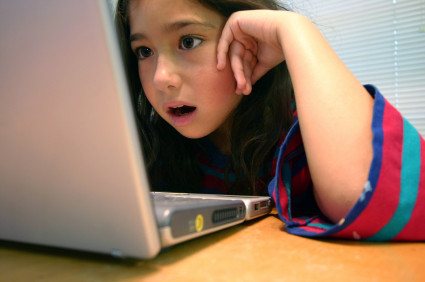Can Facebook make your child happy—or will it just lead to loneliness, as this Atlantic article-gone-viral suggests?
According to some interesting research, social media arguably can make us feel more connected and less lonely. Alternately, it can make us feel more isolated and depressed, and for kids, lead to what Erik Erikson posed as the critical psychological danger in pre-adolescence: “an excessive feeling of inadequacy and inferiority,”* a risk for tweeners heightened by social media exposure. (For more about this theory as it relates to Facebook, see Diana Graber’s excellent CyberCivics post on the subject.)
As I wrote last week, children need to be taught explicitly how to use social media, just as we would teach them to drive a car. In particular, we need to teach them how their online presence reflects three things: (1) how they want to be perceived; (2) who they want to be; and (3) their influence on the world. Here’s more about each of them.
1) How do they want to be perceived? The first lesson is about reputation management. Most kids don’t understand that everything they post online can actually be a part of the public domain—even when it seems or feels private at the time they are posting. As Graber writes for iKeepSafe:
While reputation management remains challenging for adults, imagine how difficult it is for a child to understand how the digital decisions they make today will stay with them, and the rest of cyberspace, forever.
Colleges and universities are increasingly relying on digital data when deciding who gets letters of acceptance. … Employers are increasingly conducting digital background checks on applicants before entrusting them with jobs. Today our digital footprint is our new first impression, and it starts taking shape the minute we go online.

This means it’s worth sitting down with your kids and looking at their postings as if you’re their future employer. How would you judge the character and intelligence of this prospective employee?
Through this lens, kids and teens can more easily see that reposting images with foul language makes them look rude; posting screenshots of gossipy text exchanges makes them seem shallow and mean; posting anything even remotely sexual makes them appear desperate for attention.
By the same token, posting photographs or art can be a great way to express themselves; posting interesting articles or videos can show their intelligence and their interests; heartfelt exchanges with others can show kindness and skill at building community.
2) Who do they want to be? If we want to be happy—or happier—there are ways to use Facebook and other social media to help us get there. We know that certain practices, like acts of kindness and expressions of gratitude, are highly likely to increase our happiness. Social media is a tool that can be used to practice our happiness habits.
For example, why not post a photo of something that you feel grateful for on Instagram? Or build real-life social connections by posting kind words or appreciation for others on Facebook? Or use Pinterest to collect things that inspire and fill us with awe?** When we do these things as parents, we model for our children ways of using social media to bring happiness and other positive emotions into our lives.
Facebook has even been shown to decrease loneliness when we receive “composed communication”—or personalized messages, particularly when those messages are “semi-public,” posted to groups or on our wall. So we can teach our kids to comment positively on their friends’ photos and updates in order to bring those friends more joy.
3) How do they want to influence the world? When kids start using social media to bring joy to themselves and their communities, they will quickly see that social media is a powerful way to influence the world for good. They can post comments that are likely to hurt other’s feelings, or they can post quotes that inspire. They can whine about how unfair a school policy is, or they can be an activist, using social media to articulate their position on an issue.
Kids really do need to be taught the difference between saying “that sucks” and becoming an effective activist. One of my daughter’s friends re-posted a heart-wrenching picture of an abused toddler on Instagram. She probably posted it out of compassion, but the effect of her repost was no better than a rubber-necker spreading fear. This is a complex thing that an 11-year-old can’t be expected to learn without an adult’s guidance.
The Kony 2012 campaign was the first time my daughter truly became emotionally involved in a political movement; no surprise that the campaign strategy was based on social media. (Watch the video if you haven’t already. The first two minutes are especially relevant to this discussion.)
Here’s the takeaway: We parents need to give our kids clear guidelines, and then we need to participate with them online, using their inevitable mistakes as teaching moments.
When we give them feedback about how they are perceived, and when they know they are being watched by a community of their elders (comprised of their parents, the rest of their family, and our friends, as well as their future employers) they will reach for their highest—and happiest—selves.
Additional Resources:
Common Sense Media - http://www.commonsensemedia.org/
Center on Media and Child Health (CMCH) resources - www.cmch.tv
CyberCivics - http://dianagraber-cybercivics.blogspot.com
*Erikson, E.H. (1993). Childhood and society (2nd ed.). New York: W. W. Norton. (Erikson, 1963, p. 260).
**A sidenote: Most social media is illegal for children under the age of 13 to use. At the same time, given that literally millions of pre-teens do use social media, your under-age child is probably right that “all” of their friends use them. Lying about age online is a bad habit to get into—the consequences of this can be pretty dire; at the least, it doesn’t set a great moral precedent. One way to minimize the damage here is to sign the kids up yourself, so that you can control the account. If you do this, sign them up as 13 year olds, not 40-somethings. Facebook, for example, has separate controls for users under 18.
—-
© 2012 Christine Carter, Ph.D.
Become a fan of Raising Happiness on Facebook.
Follow Christine Carter on Twitter
Sign up for the Raising Happiness monthly newsletter.


Comments